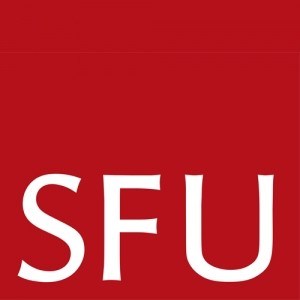Photos of university / #simonfraseru
Language is an important part of what makes us human. It allows us to express the complexities of evolution and beauty, but we can only say "spark" and not "psark", "unbelievable" and not "unteacher", and "Who do you wanna see?" and not "Who do you wanna feed the dog?" Why should that be? If you would like to learn about the many remarkable properties of language, you should take some linguistics courses. Linguistics is the scientific study of language. Linguists study the formal properties of language, how language is used in social situations, how it is acquired in infancy, how it is learned as a second language, how it evolves, and how it can be processed by computers. Linguistics is important for creating Internet search engines, for teaching English as a second language, and for understanding how suspects respond when they are being questioned by police.
Field of study: Linguistics
The Bachelor of Arts in Linguistics at Simon Fraser University offers students a comprehensive understanding of human language, its structure, use, and underlying cognitive processes. The program is designed to provide both theoretical knowledge and practical skills that are essential for analyzing the diverse aspects of language across different social and cultural contexts. Students will explore core areas such as phonetics, phonology, morphology, syntax, semantics, and pragmatics, gaining insights into how languages are constructed and how they function in everyday communication. In addition to foundational linguistics courses, students have the opportunity to study language variation, language acquisition, psycholinguistics, and sociolinguistics, enabling a well-rounded perspective on language phenomena.
The program emphasizes critical thinking, analytical skills, and research capabilities, preparing graduates for careers in areas such as language teaching, translation, speech and language therapy, computational linguistics, and language technology. Students will engage in hands-on projects, data collection, and analysis, often collaborating with faculty on cutting-edge research. The curriculum also encourages interdisciplinary approaches, allowing students to integrate knowledge from psychology, anthropology, computer science, and other fields related to language studies.
Students can tailor their education by choosing elective courses aligned with their interests, whether in theoretical linguistics, applied linguistics, or language documentation. The program prepares graduates for advanced study or professional roles that require an in-depth understanding of language structure and use. Throughout their studies, students will develop strong communication skills, critical analysis, and a nuanced appreciation of the linguistic diversity that characterizes human societies. Graduates of the program will be equipped with the knowledge and skills needed to understand and analyze complex language phenomena, making them valuable contributors to fields that rely on linguistic expertise.
Program Requirements for Bachelor of Arts in Linguistics at Simon Fraser University:
The Bachelor of Arts in Linguistics at Simon Fraser University requires students to complete a total of 40 credits for graduation. Students must fulfill core course requirements, which include foundational classes in phonetics, phonology, syntax, semantics, and morphology, to ensure a comprehensive understanding of linguistic theories and frameworks. These core courses typically encompass Linguistics 200-level and 300-level classes, such as Introduction to Linguistics, Phonetics and Phonology, Syntax, and Semantics.
In addition to the core courses, students are encouraged to diversify their education by selecting electives that complement their major. Elective courses may include areas like psycholinguistics, sociolinguistics, historical linguistics, language acquisition, and computational linguistics. Students must also complete a minimum of 15 upper-division credits (300- and 400-level courses) in linguistics or related disciplines to demonstrate advanced knowledge and research competency.
A key component of the program is a capstone project or thesis, which provides students with the opportunity to conduct original research under faculty supervision. To qualify, students must have maintained a strong academic record, typically with a minimum GPA of 2.0 in the major courses. Additionally, students are required to complete introductory courses in research methods and data analysis to prepare them for their research projects.
Language proficiency requirements may vary, but students are often advised to demonstrate proficiency through coursework or standardized testing, especially if they wish to participate in exchange programs or pursue graduate studies. Internships or co-op placements in linguistic research organizations, language technology companies, or educational institutions are recommended to enhance practical skills and employment prospects.
Advising sessions are mandatory, ensuring students progress academically and satisfy all program prerequisites. Overall, the program aims to provide students with theoretical knowledge, practical skills, and research experience in linguistics, preparing them for careers in language analysis, academic research, language teaching, or further graduate study.
The financing options for the Linguistics program at Simon Fraser University encompass a diverse range of funding opportunities designed to support students academically and financially throughout their studies. Students are encouraged to explore various sources of financial assistance, including government-sponsored awards, scholarships, bursaries, graduate fellowships, and work-study programs. The university offers several merit-based scholarships specifically for undergraduate and graduate students enrolled in linguistics and related disciplines, which are awarded based on academic achievement, research potential, or leadership qualities. Additionally, international students may be eligible for specific scholarships and financial aid programs aimed at supporting their studies in Canada.
Graduate students pursuing a MSc or PhD in Linguistics often have access to departmental funding packages, which may include teaching assistantships, research assistantships, and funded research projects. These positions provide a stipend and may also cover tuition fees partially or in full. To qualify, students typically need to demonstrate academic merit and meet departmental requirements. Furthermore, students are encouraged to apply for external funding sources such as Canadian federal and provincial grants, research councils, and international organizations that support graduate research.
Over the years, the university has also established partnerships with industry and research institutes, offering internships and project-based funding that can aid students financially while enhancing their practical experience. Students are advised to consult the university’s Financial Aid Office and the Graduate Studies website for detailed information about application procedures, deadlines, eligibility criteria, and the scope of available funding. The university’s overall goal is to make linguistic studies affordable and accessible, supporting talented students from diverse backgrounds in achieving their academic and professional goals.
The Bachelor of Arts in Linguistics at Simon Fraser University offers students a comprehensive understanding of the scientific study of language, including its structure, meaning, and social context. The program is designed to provide students with a solid foundation in the core areas of linguistics, such as phonetics, phonology, morphology, syntax, semantics, and pragmatics. Students also explore the ways in which language varies and changes across different social groups, geographical regions, and historical periods, gaining insights into language acquisition, cognitive processing, and linguistic typology. The curriculum emphasizes both theoretical and applied aspects of linguistics, preparing graduates for careers in language technology, education, research, and communication.
Students have opportunities to engage in hands-on research, analyze linguistic data, and participate in projects related to language preservation, computational linguistics, and language policy. The program also encourages interdisciplinary approaches, integrating insights from anthropology, psychology, computer science, and education. Additionally, students can tailor their studies to their interests through elective courses and specialized tracks, allowing for an individualized academic experience.
Graduates of the program benefit from a strong foundation in critical thinking, analytical skills, and cultural awareness, equipping them for diverse professional pathways. The university provides access to modern laboratories, language labs, and research centers, fostering a practical learning environment. Faculty members are actively involved in cutting-edge research in various linguistic fields, and students are encouraged to participate in seminars, conferences, and collaborative projects. Overall, the SFU Linguistics program prepares students for advanced studies or careers in fields such as speech-language pathology, translation, language teaching, artificial intelligence, and linguistic research, reflecting the dynamic and multidisciplinary nature of modern linguistics.


